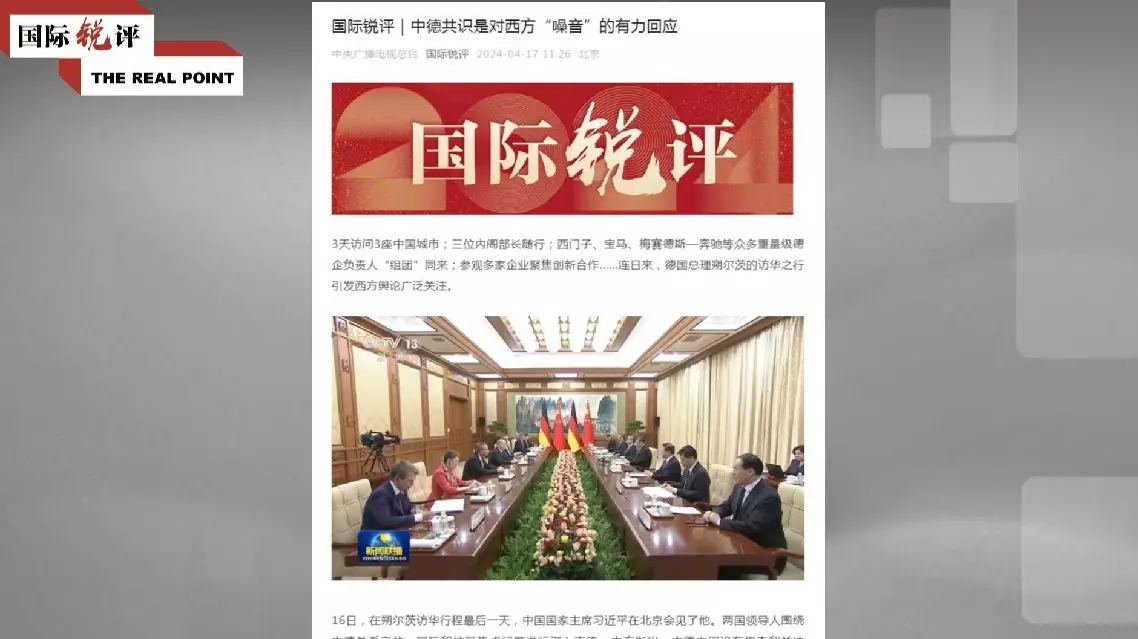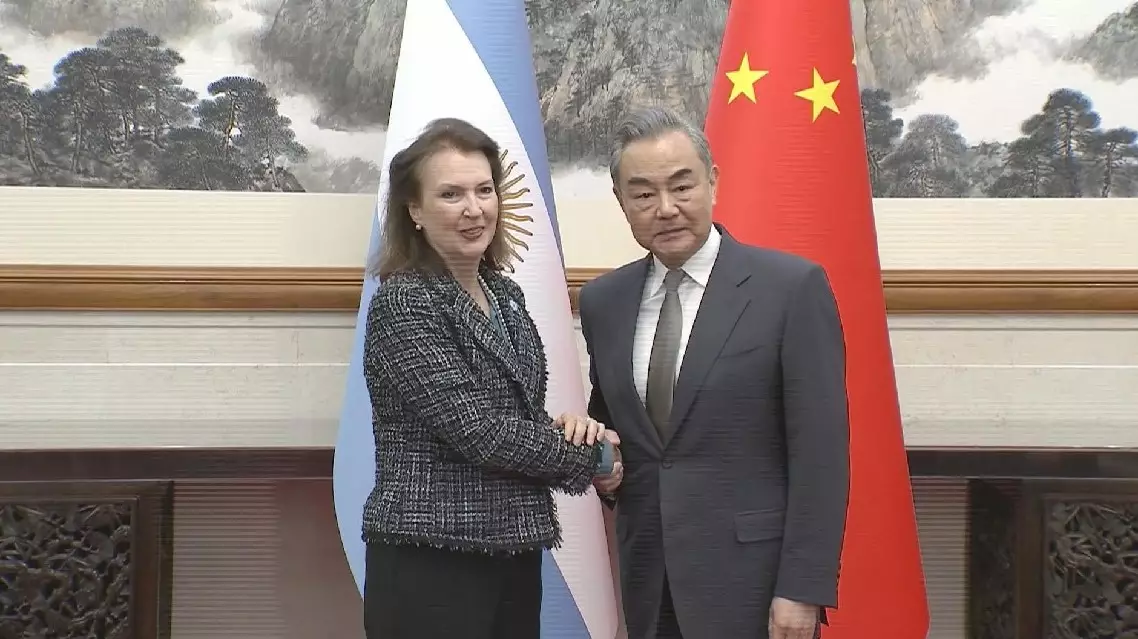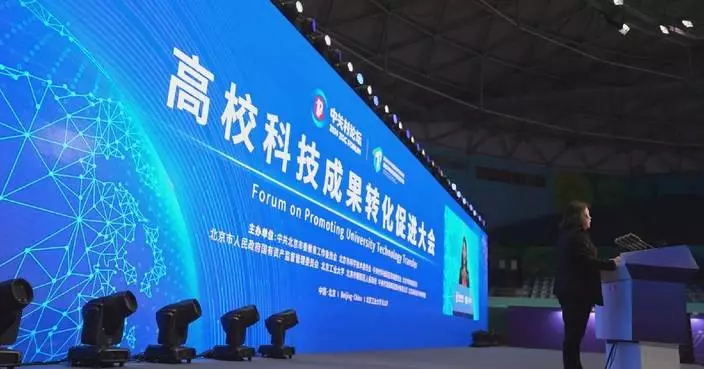The visit to China by German Chancellor Olaf Scholz is a strong response to Western protectionist clamors for decoupling and de-risking, said a commentary published by China Media Group (CMG) on Wednesday.
An edited English-language version of the commentary is as follows:
Accompanied by three ministers and a group of leaders of heavyweight German companies, including Siemens, BMW and Mercedes-Benz, German Chancellor Olaf Scholz traveled to three Chinese cities in three days and visited many companies with a focus on innovation and cooperation. The visit has been extensively followed by Western media.
On Tuesday, the last day of Scholz's trip, Chinese President met with him in Beijing. The two leaders had in-depth exchanges on the positioning of China-Germany relations, as well as pressing international issues.
Xi noted that there is no fundamental conflict of interest between China and Germany, adding that the two countries do not pose a security threat to each other.
Mutually beneficial cooperation between China and Germany creates no "risks", but serves as a guarantee for their stable relations and presents opportunities for future development, Xi told Scholz.
Scholz said that Germany is willing to further strengthen bilateral relations with China, deepen bilateral dialog and cooperation in various fields, and promote people-to-people exchanges in areas such as education and culture, which is "important for both countries and the world at large."
Both sides agreed to support free trade and economic globalization, and are willing to jointly tackle global challenges and maintain peace and stability in the world.
This clearly shows that China and Germany share similar positions on many key issues and can work hand-in-hand to inject more stability and certainty into the world.
This year marks the 10th anniversary of the establishment of the all-round strategic partnership between China and Germany. For long, China-Germany relations have been at the forefront of China's relations with major Western powers.
The two leaders are in close communication with each other, and mechanisms such as consultations between the two governments and high-level dialogs in strategic, financial and other fields are operating effectively. This sets the underlying tone of continuing cooperation for China-Germany cooperation and also promotes the steady development of China-Europe relations.
In recent years, the global geopolitical landscape has seen profound changes, and the development of China-Germany relations has encountered challenges. This China visit of Scholz also came with a lot of political clamors.
Affected by U.S. policy of containing China, there have been negative rhetoric of the so-called "threat of China's development" in Europe and even in Germany. The European Union is carrying out an anti-subsidy investigation into Chinese electric vehicles and other products in the name of "de-risking." Some European media have been hyping that Germany should "reduce its economic dependence on China."
However, both the China visit of Chancellor Scholz and the German business community's expressed willingness to delve into the Chinese market show that the "chassis" of China-Germany relations is still solid, and the German government's overall China policy remains rational and pragmatic.
The German Federal Government pointed out that Scholz's visit followed the theme of sustainable joint actions. Some German media outlets believe that Germany must seek to strengthen cooperation with China, whether to deal with the challenges of its own economic slowdown or to resolve the Ukraine crisis
Under the current circumstances, the key question is how to achieve steady and sustained development of China-Germany relations? On one hand, Germany must truly realize that China's development is not a threat to Germany and Europe, and that cooperation between the two sides is far more important than competition and differences. This is the basis for enhancing strategic mutual trust.
On the other hand, China and Germany should enhance the role of economic and trade cooperation as the ballast of bilateral relations.
As the world's second and third largest economies, China and Germany have deeply intertwined industrial and supply chains, highly interdependent markets, and resilient economic cooperation.
At present, more than 5,000 German enterprises are operating in the Chinese market.
According to statistics from German central bank, German direct investment in China rose 4.3 percent year on year to reach a record high of 11.9 billion euros (almost 12.7 billion U.S.dollars) last year.
Data from Federal Statistical Office of Germany showed that bilateral trade between Germany and China reached 253.1 billion euros in 2023, making China Germany largest trading partner for the eighth consecutive year.
Despite calls by some people in the West for decoupling, disruption of industrial and supply chains and de-risking with China, many German companies remain firmly optimistic about the Chinese market.
A business confidence survey report released by the German Chamber of Commerce in China earlier this year showed that more than 90 percent of the surveyed companies plan to remain in China, and 54 percent of them plan to increase investment in the country.
The German auto industry has clearly expressed its opposition against the EU's anti-subsidy investigation into Chinese electric vehicles.
During the meeting, both the Chinese and Germany leader said they oppose protectionism and expressed hopes for strengthening practical cooperation.
The Chinese side has charted the course for expanding China-Germany economic cooperation, suggesting that the two countries' win-win cooperation still has huge potential to be taped, both in traditional fields such as machinery manufacturing and automobiles, and in emerging fields such as green transformation, digitalization and artificial intelligence.
The rest of the world has noticed that during his stays in Chongqing and Shanghai, Scholz visited a German-funded hydrogen enterprise and a German company's innovation center, respectively. This demonstrates the German side's willingness to deepen bilateral cooperation in emerging industries.
Furthermore, China and Germany have signed a joint declaration to cooperate on autonomous and connected driving, and have signed several other bilateral cooperation agreements, indicating that both sides are turning cooperation willingness to more and more actual results.
China-Germany cooperation is beneficial for both countries and the world at large. The more turbulent the world becomes, the more the two countries need to foster resilience and vitality in their relations.
Enabling each other's success, China and Germany will contribute more to China-EU cooperation and effectively dispel the "noise" that undermines world peace and development.

German Chancellor's visit to China allays Western fears: commentary









